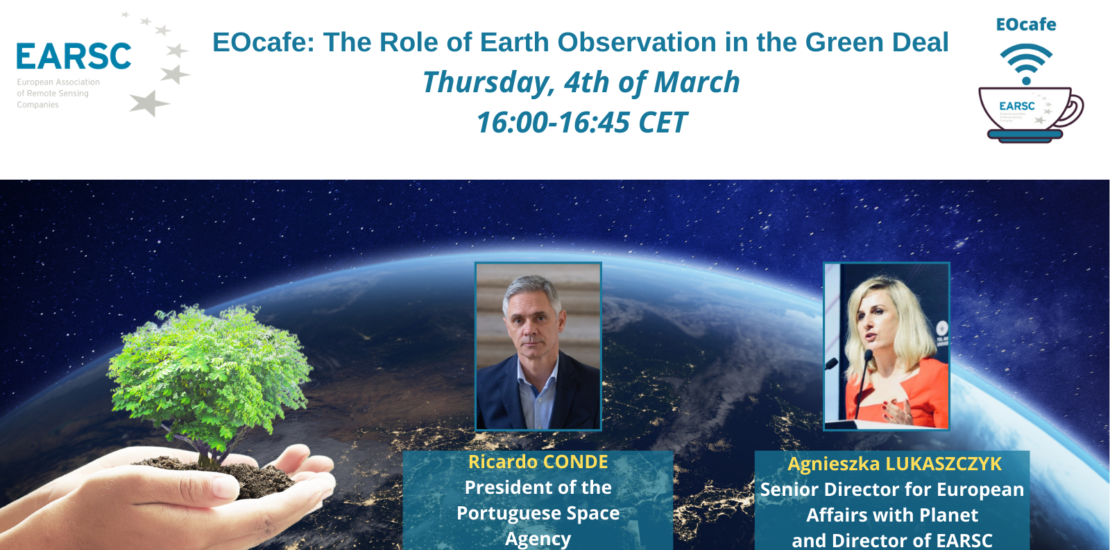- February 26, 2021
- Posted by: EARSC
- Categories: EARSC News, EOcafe

The EU has defined 6 priorities for the period 2019 to 2024 to which has been added the Recovery Plan from the COVID-19 crisis. These are driving the budget debate which should end shortly with adoption of the 2021 to 2028 budget in the European Parliament. In the EOcafe, we have previously addressed the budget and the space programme but now, under the current discussions, how are these priorities helping to shape the future of space in Europe?
The Recovery Plan sits alongside the EU budget providing finance to support the priorities. The Green Deal and the Digital Strategy will both be key policy drivers executed under the various EC programmes. The Research budget – Horizon Europe – will be a core part of the financing which will also be aligned with the 5 Missions defined by the Research Commissioner and especially that for climate adaptation. Earth Observation has a key enabling role to play within this policy framework.
- The European Green Deal is a plan to decarbonize the EU economy by 2050, revolutionize the EU’s energy system, profoundly transform the economy and inspire efforts to combat climate change. It has a strong dimension in terms of “farm to fork” as well as urbanization. The Green Deal has strong geopolitical implications in many policy areas including working with others to achieve global goals.
- Under the European Digital Strategy, the EU aims to strengthen its digital sovereignty and set standards, rather than following those of others. This includes major programmes linked to artificial intelligence, data and skills, and industrial policy.
The European Commission has set a very ambitious goal in preserving our planet and promoting the old continent as the key leader in the environmental arena as well as establishing new leadership in digital areas.
In this perspective, the tools provided by Earth Observation are many and essential. With horizontal medium and long-term objectives, the European Green Deal has to rely on cross-sector approaches entrusting in different EO instruments, in apparently, unrelated domains. These domains cover the macro areas of agriculture, forest management, biodiversity, fisheries, water management and smart mobilities. As aforementioned, by monitoring, analyzing, predicting and mitigating the human activity on natural resources, Earth Observation represents one of the most important tools for reaching a low carbon economy. Having reached this political commitment, the further step for the Union will be to turn it into a legal obligation amongst the Member States[1].
The private sector has a major role to play as is recognised in the need for an industrial policy. Companies can provide services supporting European objectives and space and earth Observation have strong potential to drive renewed economic growth. Digital tools such as artificial intelligence can help the industry provide new, global services. The programme Destination Earth launched by DG Connect and the JRC (Joint Research Centre) can bring together researchers and businesses to develop new tools to understand, monitor and manage global development.
Horizon Europe and the new Mission areas aim to help solve some of societies major challenges. Of the five, those for adapting to climate change, protecting our oceans, living in greener cities and ensuring soil health and food have a particular relevance for our sector.
In this EOcafe we will discuss all together the following:
- What are the key points of the space programme being developed under the Portuguese presidency?
- How is the Green Deal being reflected in specific elements of EC policies?
- How will these be translated into operational instruments and whose authority?
- Will the Recovery Plan contain elements which can help the space sector?
- What are the key elements which the private sector can bring to support the EU priorities?
- How will the societal mission areas be translated into action?
Our host Geoff SAWYER, EARSC’s Strategic Advisor and former Secretary General will exchange with two special guests:
- Ricardo CONDE, President of the Portuguese Space Agency
- Agnieszka LUKASZCZYK, Senior Director for European Affairs with Planet and Director of EARSC.
Registration: This webinar is open to ALL but priority will be given to EARSC members. Registration is free but compulsory. Please click on the following link to register by the 4th March at 12:00 (CET).
EOcafe Registration
Please note this is a virtual event! The details will be sent on Thursday 4th March at 12:00 (CET).
EOcafe is part of a series of EARSC meetings that offer timely, relevant, and practical information on a broad variety of topics related to the EO sector. Join us every two weeks to discuss and network while enjoying a cup of coffee with friends.
IMPORTANT NOTES!!!
• The use of a video camera is not mandatory but encouraged to facilitate better interaction among the attendees and the guest speaker(s).
• The EOcafe will stay open after 16:45 in case our guests want to continue the discussion.
If you have any questions, and/or you want to know more about the EOcafe, and/or you want to share an idea about a future EOcafe, please contact Natassa Natassa.antoniou@earsc.org
Read the Geoff’s Blog on this topic here.
[1] The European Climate Law proposal was submitted to the European Parliament, the Council, the Economic and Social Committee and the Committee of the Regions for further consideration under the ordinary legislative procedure.
